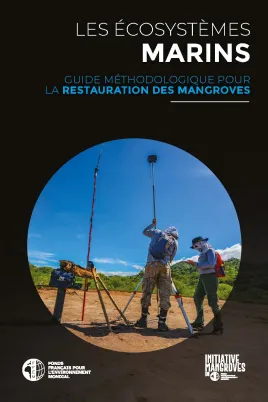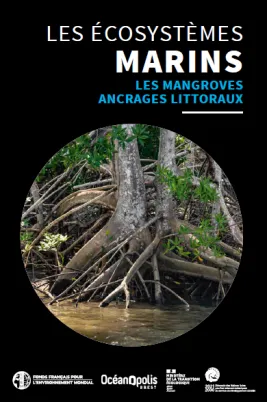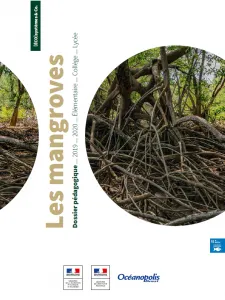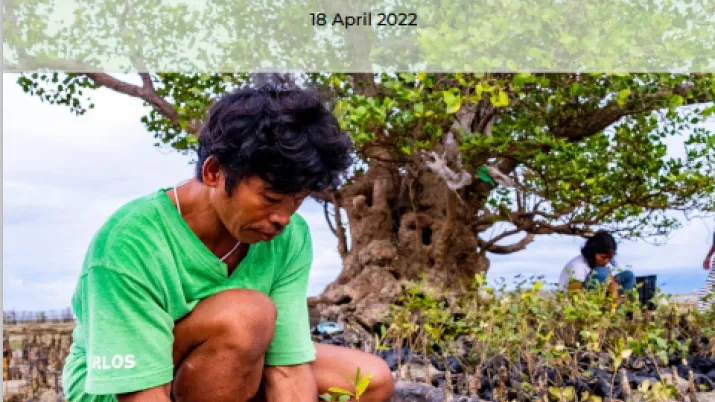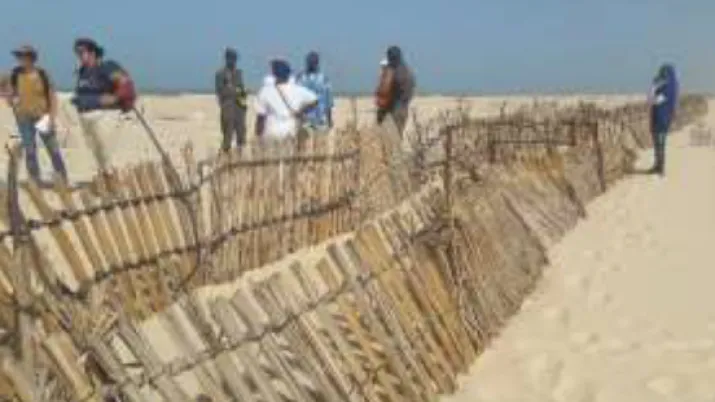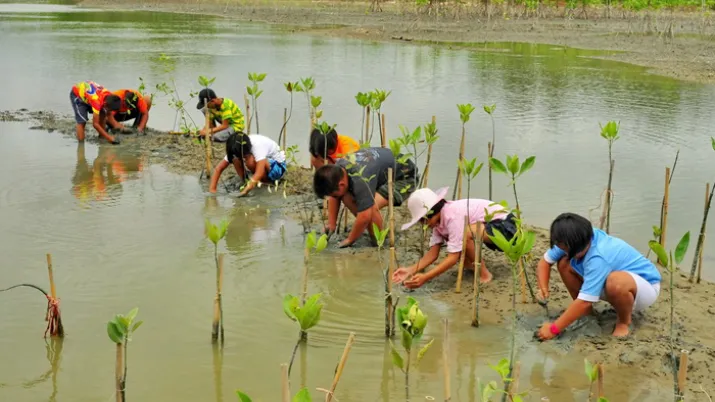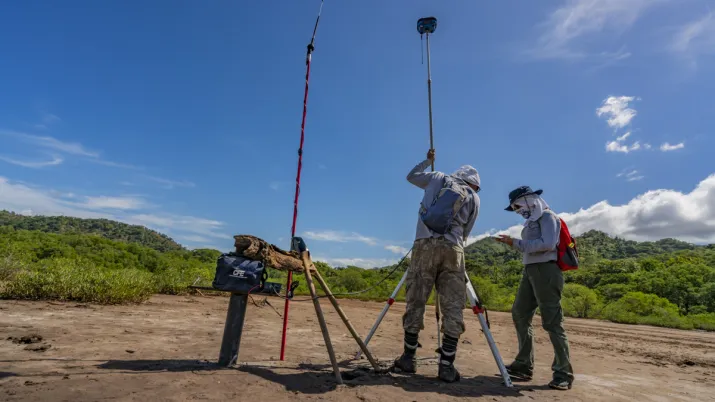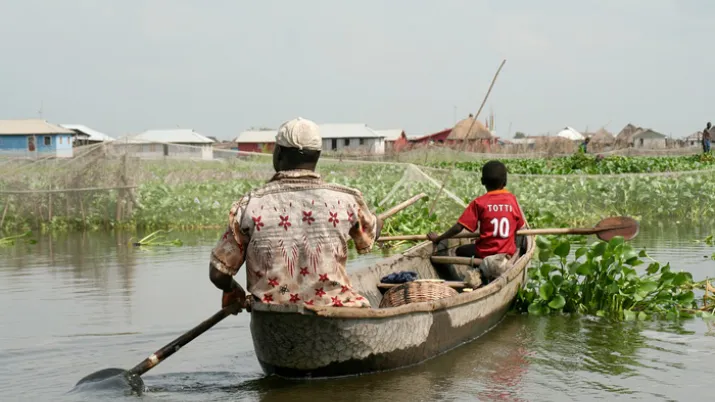Share the page
Resources and Publications of the Mangroves Initiative
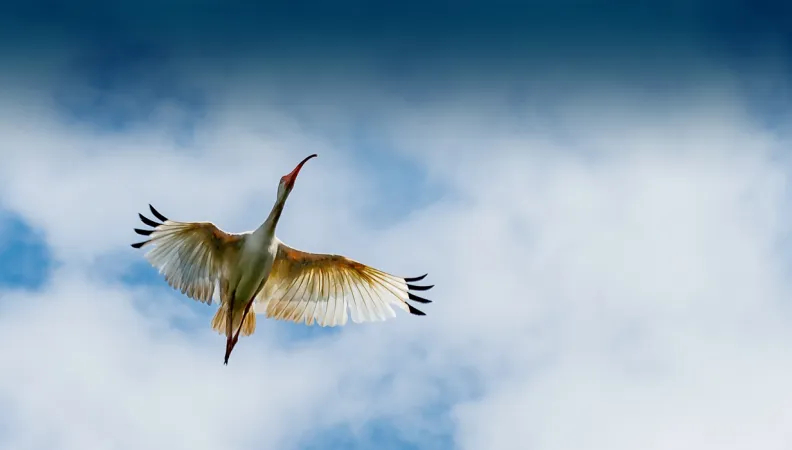
Technological and scientific monitoring involves tracking the many mangrove restoration projects worldwide, practical guides, and newly developed technologies. This information will be provided by experts and their networks, as well as through monitoring efforts. It will be made available to everyone online on the initiative’s website.
TECHNICAL GUIDES and PUBLICATIONS
INTERNET RESOURCES
Mangrove Initiative on the Web
“Integrated protection of fragile mangrove ecosystems and biodiversity in West Africa and their enhanced resilience to climate change” across 9 West African countries. This is the objective of a project signed in July 2019, funded by the European Union and jointly implemented by IUCN, Wetlands International Africa, and the 5Deltas Collective.
The project aims to strengthen stakeholders involved in the management of protected areas and non-protected mangrove sites. It seeks to connect governance and production systems with mangrove conservation structures at the territorial level. These connections will be fostered through exchanges between stakeholders in decision-making on land use and best practices, the establishment or reinforcement of dialogue platforms within landscapes, and the provision of grants to support management and conservation actions, based on competitive calls for proposals.
Three key outcomes are expected:
1. Socio-economic and sectoral activities in the landscapes are coordinated in an integrated way.
2. Effective management systems for protected areas are developed and operational.
3. Local communities benefit sustainably from protected areas and become more resilient to climate change.
> Learn more: PAPBIO website
The Global Mangrove Alliance offers a knowledge hub on mangroves. This hub provides general educational content on mangroves as well as details on projects making an impact worldwide, and publishes various types of resources to help communities, governments, policymakers, the private sector, and non-governmental organizations take action and support proven approaches that restore and protect mangroves.
> Website
The SWAMP program (Sustainable Wetlands Adaptation and Mitigation Program) aims to generate knowledge useful to decision-makers and practitioners regarding the sustainable management of wetlands in the face of global climate change and the livelihoods of local communities, based on strong scientific approaches and methodologies. It is a collaboration between the Center for International Forestry Research (CIFOR), the USDA Forest Service (USFS), and Oregon State University, with the support of the United States Agency for International Development (USAID). SWAMP originated from a multi-stakeholder exercise called Tropical Wetlands Initiative for Climate Adaptation and Mitigation (TWINCAM).
The Tropical Wetlands Resource Centre is one of the Wetlands Resource Centres dedicated to overseas wetlands and mangroves. As part of its mission, the centre structures its activities around 3 main areas:
– The dissemination of reliable knowledge on wetlands at the national level: monitoring publications, distributing newsletters, and publishing documents for professionals and the general public.
– The promotion of best practices in management and restoration within the network
– Coordination to highlight World Wetlands Day
The website offers adapted search features to find a bibliographic reference, a relevant feedback experience, or an innovative technique.
Managed by the French Agency for Biodiversity (AFB), it is led by public and private partners (Water and Biodiversity Directorate of the Ministry in charge of Ecology (MTES), Fédération Nationale des Travaux Publics, …, Union des Professionnels du Génie Écologique, and the federative association of actors in Ecological Engineering).
As part of the international initiative for coral reefs and associated ecosystems (IFRECOR), one of the actions of the national program focuses on the development of a theoretical method for sizing compensatory measures: MERCI-Cor (Method to Avoid, Reduce and Compensate Impacts in Coral Areas). In this context, a publication listing the methods for restoring coral reefs and associated ecosystems, including mangroves, has been produced.
The French Committee of IUCN is currently engaged in the development of a collection of case studies on Nature-based Solutions (actions for the protection, sustainable management, and/or restoration of natural or modified ecosystems to manage water-related natural hazards while contributing to biodiversity conservation), in order to demonstrate and illustrate the role of ecosystems in managing water-related natural risks (flooding, drought, erosion, runoff…).
This work follows on from what IUCN has already carried out to promote Nature-based Solutions in France: Nature-based Solutions
Global Mangrove Watch (GMW) is a remote sensing data and monitoring platform designed to catalyse the actions needed to protect and restore mangroves. This online platform provides policymakers, mangrove specialists, and investors with near real-time information on the location, extent, and condition of mangroves worldwide. Global Mangrove Watch is the result of a scientific collaboration with Wetlands International, Aberystwyth University, soloEO, TNC, JAXA, NASA, and many other partners. The Global Mangrove Watch platform is also the evidence-based information tool for the Mangrove Breakthrough. Check the latest updates from the Global Mangrove Watch. We have recently published a leaflet on the Global Mangrove Watch, available in 8 languages, as well as 3 briefing notes on how the Global Mangrove Watch can be used to integrate mangroves into NDCs, NBSAPs, and support Ramsar Convention resolutions. Access near real-time information on the extent, condition, and value of mangroves in the country or site of your choice.
IUCN International website, page on mangrove restoration.
Mangrove Action Project is dedicated to combating the degradation and deforestation of mangrove forests around the world. Its main goal is to promote the rights of indigenous peoples in coastal regions and local communities, involving fishers and farmers in the sustainable management of coastlines.
The CBEMR Method, a Community-Based Ecological Mangrove Restoration
By working with scientists, local NGOs, and communities, the MAP (Mangrove Action Project) organisation’s mission is to promote the mangrove restoration method known as CBEMR (Community-Based Ecological Mangrove Restoration). This method was developed after recognising the high number of failures of “traditional” restoration programmes based on nurseries followed by planting mangrove seedlings.
> Link to the CBEMR guide
To share its method, discuss, and exchange on mangrove restoration projects, MAP launched the “CBEMR e-group” which today has more than 200 members (forum in English).
The Deltas of the World is a network of actors (local and international NGOs, businesses, universities, community organisations) working for the preservation and promotion of mangrove areas.
It is made up of 3 regional networks:
1. The 5Δ collective, which includes actors from Senegal, Gambia, Guinea, Guinea-Bissau, and Mauritania, rooted in territories and in contact with local communities, in the deltas of the Senegal River, the Saloum, the Gambia, the Casamance, and the Rio Cacheu.
2. The Gulf of Benin Delta collective, which brings together actors from Togo, Benin, Ghana, Côte d’Ivoire, and Nigeria, created in February 2018 following the model of the 5Δ collective;
3. The MIHARI network, created in 2012 at the initiative of community associations engaged in the local management of marine and coastal resources in Madagascar, in close collaboration with the organisations that support them.
> The Deltas of the World Website
In this context, the DEMETER project, proposed by the 5 Deltas collective, aims to improve the management and promotion of natural resources in mangrove territories in Senegal.
Among the tools developed by “mapping ocean health” are tools related to mangrove restoration.
The site offers a global model and a map of mangrove restoration potential, by country, to help practitioners prioritise areas and to support and encourage mangrove restoration projects worldwide, developed by TNC and IUCN.
The site provides numerous resources.
The West Africa Mangrove Initiative (WAMI) is a project funded by the Swiss Foundation for the Promotion of Nature Conservation (MAVA). It brings together Senegal, Mauritania, Guinea-Bissau, Guinea-Conakry, Gambia, and Sierra Leone. It is jointly led by IUCN, Wetlands International (WI), and the Regional Partnership for Coastal and Marine Conservation (PRCM). Implemented for a period of three (03) years (2007–2010), the project capitalised on a number of key results based on defined strategies:
– The development of a knowledge base on the values, ecological status, and management of mangroves
– The transfer of knowledge from communities at the regional level and the establishment of motivating conditions for the sound management of mangroves
– The strengthening of national and regional policies and the development of an action plan
Roy Lewis Website:
www.mangroverestoration.com
The main objective of the GDZHAO project is to improve knowledge of West African wetlands (ZH) through the development of a monitoring service for these sensitive areas, with a view to strengthening food security and restoring these ecosystems using Earth Observation (EO) data. It is the result of collaboration between the African Union Commission and the European Union under the concept “Two Unions, One Vision.” It is funded for a duration of 3 years within the global GMES&Africa programme and covers 8 West African countries (Burkina Faso, Côte d’Ivoire, Gambia, Ghana, Republic of Guinea, Mali, Niger, and Senegal).
The Mikoko project is a two-year initiative whose main objective is to restore and conserve mangrove forests in Kenya in order to improve socio-economic well-being and ensure environmental sustainability, particularly in the context of climate change.
> Information on the MIKOKO exchange portal
> MIKOKO Website
> MIKOKO Programme
Site dedicated to the presentation of nature-based solutions, including mangroves (restoration, ...)
INITIATIVE RESOURCES
Below you will find publications related to the Mangroves Initiative.
Mangroves Initiative publications
Mangroves Initiative news
End of project in the Philippines: concrete but sometimes mixed results
Published on February 15, 2023
Mild solutions in the Saint Louis MPA
Published on March 21, 2022

